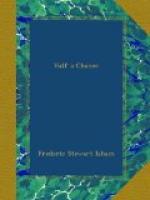“The one I furnished you!” Captain Forsythe rested his chin on the knob of his stick. “Odd about that, wasn’t it?—that the day in the library at Strathorn House, when I was about to tell you how I had better success the second time I visited the landlady, we should have been interrupted. And,” looking at the other furtively, “by Jocelyn Wray!” Steele did not answer. “If I had only seen the drift of your inquiries, had detected more than a mere perfunctory interest! With the confession given me on her death-bed by the landlady, that she had testified falsely to protect her good-for-nothing son, and acknowledging that another whom she did not know by name, but whom she described minutely, had entered the house on the fatal night—with this confession in your hands, a world of trouble might have been saved. As it is,” he ended half-ruefully, “you have found me most unlike the proverbial friend in need, who is—”
“A friend, indeed!” said John Steele, placing a hand on the other’s shoulder, while a smile, somewhat constrained, lighted his face for a moment. “Who at once rose to the occasion; hastened to London on the receipt of a letter that was surely a test of friendship—”
“Oh, I don’t know about that!” quickly. “Test of friendship, indeed!” Captain Forsythe looked slightly embarrassed beneath the keen searching eyes. “Don’t think of it, or—Besides,” brightening, “I had to come; telegram from Miss Wray, don’t you know.”
“Miss Wray!” Steele’s hand fell suddenly to his side; he looked with abrupt, swift inquiry at the other.
Captain Forsythe bit his lips. “By Jove!—forgot—” he murmured. “Wasn’t to say anything about that.”
“However, as you have—” John Steele regarded him steadily. “You received a telegram from—”
“At the same time that your letter intercepted me at Brighton.”
“Asking you to return to London?”
“Exactly. She—wanted to see me.”
“About?” John Steele’s eyes asked a question; the other nodded. “Of course; not difficult to understand; her desire to hush up the affair; her fear,” with a short laugh, “lest the scandal become known. A guest at Strathorn House had been—”
“I don’t think it was for—”
“You found out,” shortly, “that she, too, had learned—knew—”
“Yes; she made me aware of that at once when she came to see me with Sir Charles. It was she sent your luggage—”
“Sir Charles? Then he, also?—”
“No. You—you need feel no apprehension on that score.” A peculiar expression came into the other’s glance. “You see his niece told him it was not her secret; asked him to help her, to trust her. Never was a man more perplexed, but he kept the word he gave her on leaving for London, and forebore to question her. Even when they drove through London in that fog—”
“Yes, yes. I know—”
“You? How—?”
John Steele seemed not to hear. “She saw you that night?”




